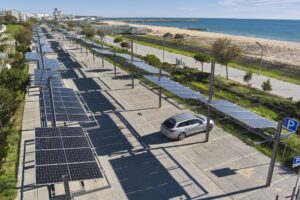Investment || Private investors are planning to build what would become Europe’s biggest solar plant in Alcoutim, local mayor Osvaldo Gonçalves has confirmed.
The project, led by an unnamed private company and presented to Portugal’s Environmental Agency (APA), includes the construction of a solar plant covering 800 hectares of the Martinlongo and Vaqueiros parishes of Alcoutim, able to produce 200 megawatts (MW) of solar power. National media reports that the investment could amount to €220 million.
If all goes according to plan, the Alcoutim plant will also create around 600 jobs, which is why local mayor Osvaldo Gonçalves says the project would be like “winning the Euromillions” for the border town, which struggles with a declining population and the difficulty to attract young families.
“If we could couple this investment with the construction of a photovoltaic panel production unit, it would be the icing on the cake,” the mayor said.
Admitting that he was caught by surprise by the news, Gonçalves said that he was “pleased” nonetheless to hear it.
“I was unaware of this project and contacted APA to find out if the news was true and was told that the project had in fact been handed in,” the mayor said.
The mayor stressed that Alcoutim has “many hectares of land with the right conditions” to home this type of infrastructures as well as many hours of sun per year to power the plant.
Thus he hopes that authorities such as APA, the Portuguese government and the local council itself will be willing to approve the project.
To help explain the ambitious nature of the project, Portugal currently has an installed solar power capacity of 346 MW – 156 MW of which is provided by smaller facilities and 190 MW from larger units.
The country’s largest plant is located in Amareleja in Moura, Beja, which ‘only’ produces 46 MW, while Europe’s largest facility is Solarpark Meuro, located in Germany, which produces around 170 MW.
If the project moves forward, the plant will become Europe’s biggest solar plant, beaten only by plants in the USA, China and India.
The project is also being seen as a way of reducing Portugal’s dependence on fossil fuels, especially at a time when the possibility of oil rigs being set up along the Algarve coast is generating a heated debate.
However, for now, further details about the plans are being kept under wraps by APA.


















